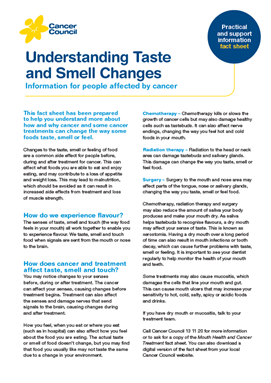- Home
- Cancer Information
- Living well
- Nutrition and cancer
- Treatment side effects and nutrition
- Changes in taste or smell
Changes in taste or smell
Some treatments can affect the taste and smell of foods. Chemotherapy and targeted therapy drugs can change the taste receptors in the mouth. Radiation therapy or surgery to the head, neck and mouth area can damage the salivary glands and tastebuds on the tongue. Food may taste bitter or metallic, or may not have as much flavour as before.
Learn more about:
Overview
It’s common to have changes in taste during treatment and for a short time afterwards. People with cancer often say, “All food tastes the same”, “Food tastes like cardboard”, “Food tastes metallic”, or “I no longer like the taste of my favourite food”. It may take several months for your sense of taste to return to normal. In some cases, taste changes may be permanent.
Some people find that even the taste of water is a problem. This can make it challenging to get through the recommended amount of water each day and to swallow medicines with water. Adding lemon, lime, fruit juice, cordial or fresh mint to water may make it easier to drink.
A sore mouth, sore throat or swallowing difficulties can make it hard to eat. Talk to your doctor, speech pathologist, dentist or dietitian – If you have a sore mouth, sore throat or swallowing difficulties, talk to your doctor, speech pathologist, dentist or dietitian – some of the suggestions below will not be suitable.
For more on this, see Taste and smell changes.
How to manage changes in taste or smell
Taste changes |
Smell changes |
|
|
During treatment, I developed an active sense of smell. I hated certain smells and did all I could to avoid them. My mouth felt very dry, which made food taste unappetising. Adding extra sauce helped.
Helen
→ READ MORE: Managing dry mouth
More resources
Jacqueline Baker, Senior Oncology Dietitian, Chris O’Brien Lifehouse, NSW; Lauren Atkins, Advanced Accredited Practising Dietitian, OnCore Nutrition, VIC; Dr Tsien Fua, Head and Neck Radiation Oncology Specialist, Peter MacCallum Cancer Centre, VIC; Rosemerry Hodgkin, 13 11 20 Consultant, Cancer Council WA; Clare Hughes, Manager, Nutrition Unit, Cancer Council NSW; John Spurr, Consumer; Emma Vale, Senior Dietitian, GenesisCare, SA; David Wood, Consumer.
View the Cancer Council NSW editorial policy.
View all publications or call 13 11 20 for free printed copies.
Need to talk?
Support services
Exercise and cancer
Exercise has many benefits both during and after cancer treatment, helping with side effects, speeding up recovery, and improving quality of life
Looking for transport, accommodation or home help?
Practical advice and support during and after treatment
Cancer information
Relaxation and meditation
Learn how relaxation and mediation can help you both during and after cancer treatment, or listen to our relaxation and meditation podcast
Cancer treatment
Learn about the different treatments that are used to treat cancer, such as surgery, chemotherapy, radiation therapy and targeted therapy

